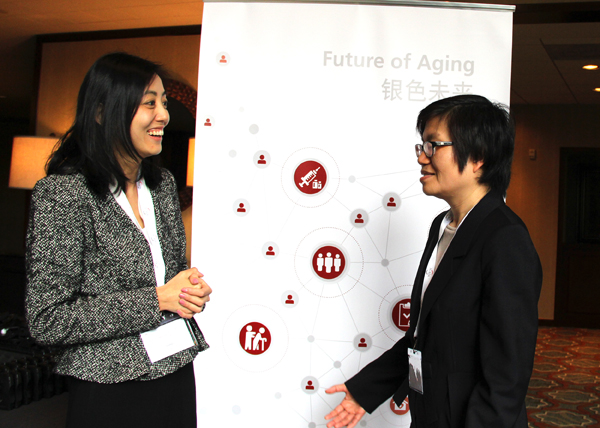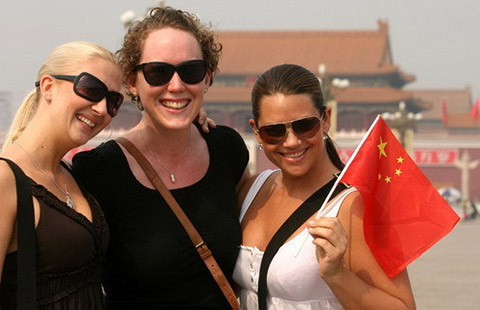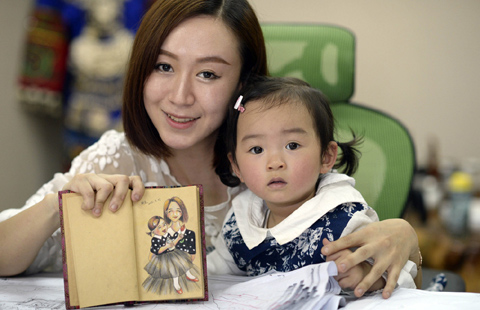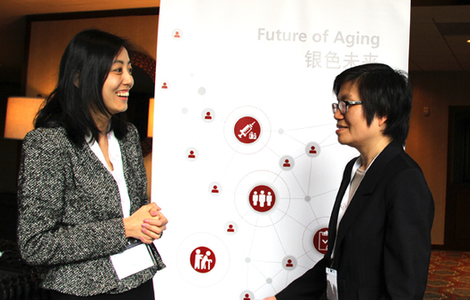Elderly care explored for investors, needy
Updated: 2015-03-31 07:02
By MAY ZHOU in Austin(China Daily USA)
|
||||||||
 |
|
Yvonne Li(left), chairwoman of the International China Ageing Industry Association, talks to Wu Bei, director of international research at Duke University nursing school, at the US-China Elderly Healthcare Investment Forum in Austin,Texas, on Monday. [MAY ZHOU / CHINA DAILY] |
China is coming to the US to learn how to better take care of its elderly population, as well as provide investment opportunities for US companies.
Conversely, US experts are also trying to get Chinese investors to look at opportunities in the sector here in the US as Baby Boomers edge toward retirement.
The one-day US-China Elderly Healthcare Investment Forum, organized by International China Ageing Industry Association (ICAIA), was held on March 30 in Austin, TX. More than 20 Chinese delegation members and scores of industrial experts from the US attended.
The Chinese delegation, led by Yvonne Li, chair of the ICAIA, had also toured different types of elderly care facilities in San Francisco and Austin prior to the forum.
"The delegation tried to learn about various models of elderly care. The US has had about 60 years of experiences in taking care of elder populations, China can definitely learn from their experience," said Li.
According to data provided by ICAIA, China's current population above age 60 has exceeded 200 million, of which 12 million are above the age of 80. By 2050, number of persons above 60 will reach 478 million, accounting for 33 percent of the population, and 1 in 5 will be over 80.
Consequently, the elderly care market in China is estimated to grow to RMB 1.8 trillion by 2020 and 7.6 trillion by 2050.
"It's our social mission to help China scale up in elderly care very quickly. There are so many challenges. Not that the US has got all the answers, but it can provide some new thinking. This requires industry, investment, research, and ideally government working together. We want to bring people together to learn how to work with each other. We want to do this with an interdisciplinary approach and try not repeat mistakes made by other countries," said Li.
Wu Bei, director of international research at Duke University's school of nursing, said that even the US is pushing for more community-based healthcare for the elderly with a decline in nursing home enrollment in recent decades, and this is what China should aim for.
"China needs to learn how to deliver quality community-based care. One area China can improve is in skills training," said Wu.
This is because the majority of elderly care in China is home-based and often the hired nursing maids or helpers lack the basic skills to perform such service. How to handle an elderly patient with dementia, how to properly administrate medicine, how to encourage elders to move around, it's all part of quality care, Wu pointed out.
"Now that China is in the developing stage of elderly care, it can learn from other countries, including the US, to develop a workable model. Right now even people with money can't find adequate quality care in China," said Wu.
Wu emphasized that establishing successful models to provide quality care for all income levels was very important for the future of China's elderly care and hopefully forums like this could help it happen. She also said the Chinese government needed to increase public funding for elderly care, especially for low-income and rural populations.
A panel led by Benjamin Shobert, founder and managing director of Rubicon Strategy Group, provided insight into the industry trends from an investment angle and potential opportunities in elderly care in the US.
Another panel, led by Marina Bhargava, executive director of the Greater Austin Asian Chamber of Commerce, presented successful cross-border partnerships in the elderly care sector, and discussed the key factors essential for developing successful long-term partnerships.
"In China the system is different. The policy, the government reimbursement and regulations are all different. There is less governmental support in this area right now. You need to be there long term to make it work,” said Jim Biggs, managing director of Honghui Senior Housing Management Consulting, who has been working in China for the past few years.
"You have to understand it's not a real estate project but a long term care service," said Joe Christian, founder of China Senior housing Advisors, LLC.
mayzhou@chinadailyusa.com

 6 cultural differences between China and the US
6 cultural differences between China and the US
 Mother illustrates her pregnancy
Mother illustrates her pregnancy
 In memory of movie star Leslie Cheung
In memory of movie star Leslie Cheung
 Top 10 best employers in China in 2015
Top 10 best employers in China in 2015
 World's largest reclining Buddha statue in Jiangxi
World's largest reclining Buddha statue in Jiangxi
 First round-world solar flight stops in China
First round-world solar flight stops in China
 Elderly care explored for investors, needy
Elderly care explored for investors, needy
 Sasha Obama took trip to China
Sasha Obama took trip to China
Most Viewed
Editor's Picks

|

|

|

|

|

|
Today's Top News
US 'miscalculated' on AIIB: Albright
China PMI indicates factories back to expansion
Chinese woman charged with fraud remains in US jail
46 countries apply to AIIB
Tales of a nomad
US 'willing to work with AIIB': Lew
Silk Road connects China to the world: BOC chairman
Washington 'willing to work with AIIB'
US Weekly

|

|






